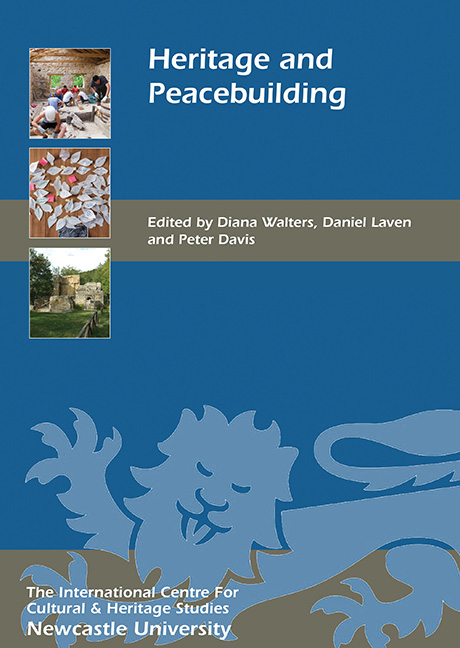Book contents
- Frontmatter
- Contents
- List of illustrations
- Acknowledgements
- List of abbreviations
- Preface
- Introduction
- NEW AND EMERGING IDEAS AROUND HERITAGE AND PEACE
- HERITAGE AND PEACEBUILDING IN PRACTICE
- 7 A Conversation with Sultan Somjee: Conflict and Peacebuilding in Kenya
- 8 Museum, Peace and Reconciliation: the Impact of the Balkan Museum Network
- 9 Diversity, Leadership and Peacebuilding in Museums in the Western Balkans
- 10 Disturbing the Peace: Museums, Democracy and Conflict Avoidance
- 11 Transforming Conflict Through Peace Cultures
- 12 Rethinking Heritage from Peace: Reflections from the Palestinian–Israeli Context
- 13 A Conversation with Will Glendinning: Diversity Challenges in Northern Ireland
- HERITAGE, PEACEBUILDING AND SITES
- List of Contributors
- Index
- Previous Titles
9 - Diversity, Leadership and Peacebuilding in Museums in the Western Balkans
from HERITAGE AND PEACEBUILDING IN PRACTICE
Published online by Cambridge University Press: 16 February 2018
- Frontmatter
- Contents
- List of illustrations
- Acknowledgements
- List of abbreviations
- Preface
- Introduction
- NEW AND EMERGING IDEAS AROUND HERITAGE AND PEACE
- HERITAGE AND PEACEBUILDING IN PRACTICE
- 7 A Conversation with Sultan Somjee: Conflict and Peacebuilding in Kenya
- 8 Museum, Peace and Reconciliation: the Impact of the Balkan Museum Network
- 9 Diversity, Leadership and Peacebuilding in Museums in the Western Balkans
- 10 Disturbing the Peace: Museums, Democracy and Conflict Avoidance
- 11 Transforming Conflict Through Peace Cultures
- 12 Rethinking Heritage from Peace: Reflections from the Palestinian–Israeli Context
- 13 A Conversation with Will Glendinning: Diversity Challenges in Northern Ireland
- HERITAGE, PEACEBUILDING AND SITES
- List of Contributors
- Index
- Previous Titles
Summary
The complexity of reconciliation efforts underscores the importance of good leadership. Importantly, recent experiences have also shown us that women are recognised across the world as powerful agents for change and peace. There are pragmatic arguments that underline the importance of female participation in peacebuilding. Many conflict analysts, regardless of gender, note that the peace being negotiated at a political level must be rooted among and accepted by the people who have to live with it. The input of women – representing at least half the population – is thus indispensable, and consequently women play a vital role in heritage organisations in breaking divisiveness and building peace. For example, women in Liberia forcefully demanded through peaceful demonstration that their government bring about immediate peace and hold democratic elections; this was key to the ending of the Second Liberian Civil War in 2003. Female leaders from Liberia, Pakistan, Tunisia, Libya, Egypt, Yemen and Samoa shared compelling accounts of their innovative leadership approaches at a panel event organised by the United States Institute of Peace in 2012 and were recognised for leading change in their transitioning societies (United States Institute of Peace 2012). The power of women to positively influence conflict and crises has been convincingly demonstrated by the 2011 Nobel Peace prize winners Ellen Johnson Sirleaf and Leymah Gbowee from Liberia and Tawakkol Karman from Yemen. In his words of congratulation, Dutch Minister of Foreign Affairs Uri Rosenthal said, ‘The award of the Nobel Peace Prize to these three women is a marvellous acknowledgement that women are not victims but current and future leaders’ (Government of the Netherlands 2011).
Innovative approaches to leadership and decision-making are critically important to a process of non-violent change around the world. Effective leadership in such contexts includes innovative ideas and bold risks to make change happen. From film-making to an NGO focused on rehabilitating female child soldiers to creating family businesses in remote places, women have found that staying grounded in the community is important to making a sustainable impact (Ministry of Foreign Affairs of the Netherlands 2011). Women can bring a particularly determined, singleminded and resolute approach which breaks deadlock, forcefully challenges entrenched and prejudiced attitudes and is positive and forward-looking.
- Type
- Chapter
- Information
- Heritage and Peacebuilding , pp. 93 - 108Publisher: Boydell & BrewerPrint publication year: 2017



